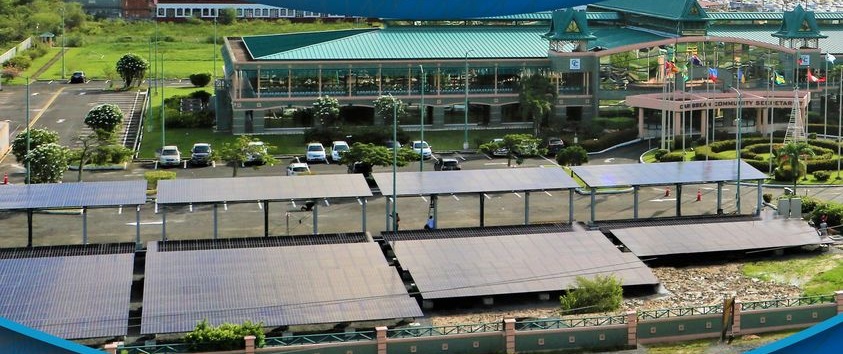400-kw Solar Power Plant unveiled at CARICOM HQ
In a bid to transform the Caribbean into a more self-sufficient region, the Caribbean Community (CARICOM) has taken the big leap and bared a seven-million-dollar project on renewable energy.
The project called the Solar Photovoltaic Power Generation Plant with Battery and Power Conditioning Systems was unveiled in a handover ceremony on January 11, 2022, at the Guyana headquarters of CARICOM.
Around 1,500 solar panels were installed at the Guyana headquarters of the CARICOM to generate 400-kilowatt energy that will be harnessed from the Sun. The servers and the batteries were also installed, along with provision for carports and educational/recreational activities. The staff were trained to man the operations.
“This power generation system is expected to generate more electricity than is required by the Secretariat for its operation on an annual basis, and the expectation is that the available excess energy would ‘feed‑in’ to the utility grid during its off‑peak operation periods,” said CARICOM Secretary-General Dr Carla Barnett in her remarks during the handover ceremony of the power plant.
Barnett also expressed her hopes that the plant will help CARICOM obtain a net-zero energy balance “on the basis of the fact that there will be available excess energy.” The surplus will then be stored to “provide power to the national grid during its off-peak operations,” she said.
The Governments of Japan, Guyana, and the CARICOM Secretariat worked together to develop and finance this US$7M project.
“Growth is fragile and vulnerable for CARICOM countries. We are exposed to hazardous features over which we have little control or influence. The current pandemic serves as a manifestation of this,” Barnett added.
The Caribbean’s potential for renewable energy has been highlighted in a report by the Renewable Energy World.
“The Caribbean economy – except for Trinidad and Tobago – is almost entirely dependent on diesel fuel or natural gas,” wrote Martin Vogt, managing director at MPC Renewable Energies, adding that “solar energy holds, perhaps, the most promise as a future power source” in the region.
“With about 217 days of sunshine a year, the Caribbean has excellent solar resources enabling solar PV plants to generate electricity at similar or less expensive costs than conventional power plants do,” Vogt said.
The project was supposed to be implemented on April 30, 2020, but because of the pandemic, it was put to a standstill. Work resumed in June 2021 and was safely concluded in December 2021, said Barnett.



